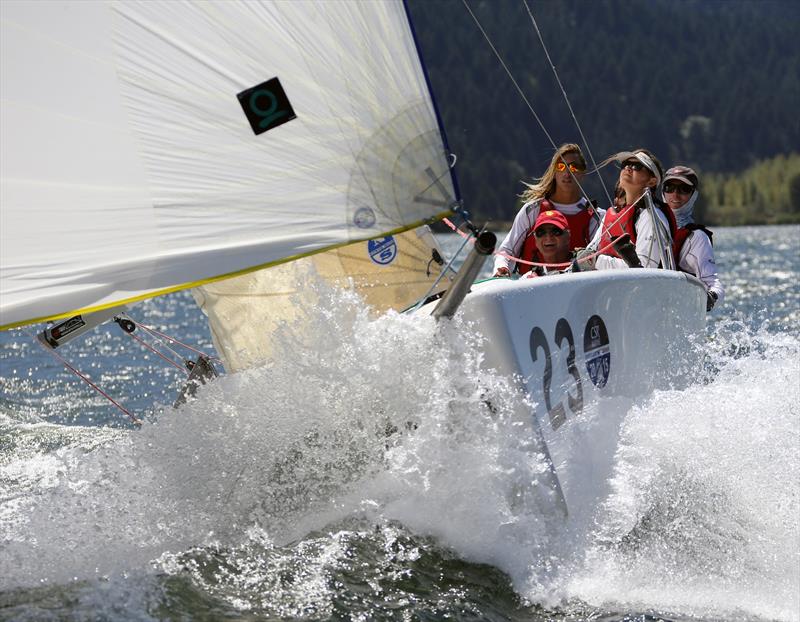
An interview with Bill Symes on the 2023 Columbia Gorge One Design Regatta
by David Schmidt 26 Jul 2023 16:00 BST
July 28-30, 2023

Racecourse action at the Columbia River Gorge Sailing Association's annual Columbia Gorge One-Design Regatta © Jan Anderson
It's no surprise that when wind and water come together in strength and reliability, high-performance sailors follow. This certainly holds true for the usually windy waters of the Columbia River Gorge, which is situated about an hour east of Portland, Oregon, in the town of Cascade Locks. The Columbia Gorge Racing Association (CGRA) is based in Cascade Locks, and each summer CGRA does its best to lure the fastest guns around to their annual Columbia Gorge One Design Regatta (CGOD; July 28-30, 2023).
This usually isn't a hard sell, given the area's fine reputation for delivering breeze-on racing and CGRA's 26-year history hosting CGOD.
This year's regatta is open to RS Aeros, ILCAs, 505s, Melges 15s, Tasars, and Melges 24s, and racing is set to unfurl on the waters off of Cascade Locks Marine Park. While each year varies, winds often build through the morning and into the afternoon, often topping out in the high 20s, with gusts into the low 30s.
Giddyap!
I checked in with Bill Symes, CGRA's vice president, via email, ahead of this historically fitness-forward regatta, to learn more.
It's been four years since we last talked about the CGOD. Can you bring us up to speed on any changes, modifications, or additions to the regatta that you and the other organizers have made over these years?
This will be the 21st year CGRA has hosted CGOD. Not much has changed and it's still going strong.
Many of the classes we had at the first regatta in 2002 will return this year, including Lasers, Tasars, 505s, International 14s, and Melges 24s. We're also pleased to welcome the new Melges 15 fleet to CGOD.
I'm looking forward to a great weekend of sailing in the Gorge.
How are your entry numbers looking this year compared to recent editions? Also, are most entrants local to the Pacific Northwest, or do you get teams and sailors from other regions?
Numbers have been up and down the past couple of years, and we still haven't gotten back to pre-pandemic levels (70+ [boats]). A lot also depends on the classes themselves and how CGOD fits into their schedules for the season.
We expect somewhere around 30-50 boats to show up this year, most from the Pacific Northwest, but we're also seeing entrants from Southern California, Nevada, and Idaho.
How would you describe the event—both the racing and the onshore activities—to someone who hasn't yet participated?
CGOD is a blast. It's a wonderful mix of high-octane racing on a beautiful river followed by laid-back socializing in a beautiful park, with hot food, cold beverages, and good friends. Guaranteed to be a memorable weekend.
What are conditions usually like on the Columbia River in late July? Windy?
Typical July winds are from the west, filling in around mid-morning at 10-15 [knots] and rising to 20+ by mid-afternoon. Windy days can see peak gusts in the low 30s.
You may also see an occasional east wind if the western valleys are experiencing very hot weather. And, yes, we do have no-wind days (about one or two a summer).
There's a lot of topography near and around the Columbia River and Cascade Locks. What kind of effect does this usually have on the breeze? Any secrets you care to divulge?
The topography is breathtaking, but not [a] big factor in racing strategy. The prevailing westerly winds are driven by warm air rising in the eastern desert and drawing cool marine air from the west through the gap in the mountains. The wind generally follows the path of the river on its journey through the Gorge, rising in intensity as it goes further east.
The only secrets I know are to hike hard and tack on the headers.
Has there been any talk about opening future editions of the event up to wing foilers?
CGRA has been working with the US Sailing team to bring IQ Foilers to training regattas in the Gorge. We hope to do more in the future, but we probably won't be including foilers in a big multi-class regatta like CGOD because, at the speeds they're going, they really need a wide-open racetrack.
Can you tell us about recent steps that you and the other organizers have taken to help lower the regatta's environmental wake?
We have received a Clean Regatta certification from Sailors for the Sea, and [we] adhere to best practices with regard to recycling, trash management, water bottle reduction, oil spill prevention and boat maintenance.
Our venue is pretty spartan, so consumption and waste are kept to a minimum.
All camping, regatta dinners, and other social activities are in the Marine Park, and we're easy walking distance from local restaurants and hotels. We have a filtered water refill station on site and give out reusable water bottles on request. We are currently migrating to electronic race documentation to reduce our use of paper.
Is there anything else about this year's CGODR that you'd like to add, for the record?
Only that we welcome your readers to come out to the Gorge and join the fun, either as participants, spectators, or volunteers. CGRA is a non-profit, all volunteer organization, and it takes a lot of help to put on these events.
We're just a bunch of dinghy sailors who love sailing in the Columbia River Gorge, and want to share this incredible resource with the rest of the world sailing community.
To learn more, volunteer or make a tax-deductible charitable contribution to CGRA, please visit us at www.cgra.org.